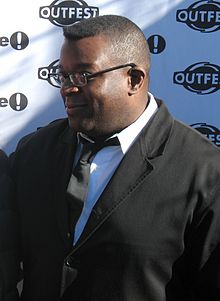Isaac Julien
| Isaac Julien | |
|---|---|
 |
|
| Born |
21 February 1960 London, England |
| Occupation | Installation artist and filmmaker |
Isaac Julien (born 21 February 1960) is an installation artist and filmmaker.
Julien was born in the East End of London, one of the five children of his parents, who had migrated to Britain from St Lucia. He graduated from Saint Martin's School of Art in 1985, where he studied painting and fine art film. He co-founded Sankofa Film and Video Collective in 1983, and was a founding member of Normal Films in 1991.
Julien came to prominence in the film world with his 1989 drama-documentary Looking for Langston, gaining a cult following with this poetic exploration of Langston Hughes and the Harlem Renaissance. This following was expanded in 1991 when his film Young Soul Rebels won the Semaine de la Critique prize for best film at the Cannes Film Festival.
One of the objectives of Julien's work is to break down the barriers that exist between different artistic disciplines, drawing from and commenting on film, dance, photography, music, theatre, painting and sculpture, and uniting these to construct a powerfully visual narrative. Thematically, much of his work directly relates to experiences of black and gay identity (he is himself gay), including issues of class, sexuality, and artistic and cultural history. He was nominated for the Turner Prize in 2001, and in 2003 he won the Grand Jury Prize at the Kunst filmBiennale in Cologne for his single screen version of Baltimore. Julien is also a documentary filmmaker - his work in this genre includes BaadAsssss Cinema, a film on the history and influence of blaxploitation cinema.
Julien readily cites cultural theorist and sociologist Stuart Hall as an important influence on his filmmaking. Hall narrates a portion of Julien's critically acclaimed "Looking for Langston." Julien involves Hall in his work once more in the 1996 film "Frantz Fanon: Black Skin, White Mask" which tells the story of Frantz Fanon, the theorist and psychiatrist from Martinique.
...
Wikipedia
